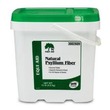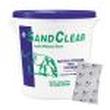Pronunciation
SIL-ee-um HYE-druh-fil-ik MYUS-uh-loid - Pronunciation guide
Brand Names
- Equi Aid Natural Psyllium Fiber Pellets
- Equi Aid Natural Psyllium Fiber Powder
- Miracle Sand Out Pellets
- Sand-Rid Psyllium Pellets
Description
Psyllium hydrophilic mucilloid is derived from the ripe seeds of varieties of Plantago species. The seed coating has a high hemicellulose mucillage content, which swells in the presence of water, making it a major component of bulk-forming laxatives.
Usage
Psyllium hydrophilic mucilloid is used in horses that have a problem with constipation, and some veterinarians recommend it for treatment of sand colic. By swelling as it absorbs water, psyllium increases bulk in the intestine and is believed to induce peristalsis and decrease intestinal transit time. In treatment of sand colic, psyllium is thought to help collect sand and lubricate its passage through the gastrointestinal tract.
Dosage and Administration
| Psyllium | ||||
|---|---|---|---|---|
| Method | Dosage (click row for calculator) |
Concentration | Period | Duration |
| Oral | 5-7.5 ounces | 20450 mg/ounce | Daily for 7 days | Repeat Monthly |
Notes:
|
||||
Precautions
Bulk-forming laxatives should not be used when prompt intestinal evacuation is required, in cases of fecal impaction, or if an intestinal obstruction is present.
Interactions
Because the potential exists for bulk-forming laxatives to bind digoxin, salicylates, and nitrofurantoin, it is recommended that bulk-forming laxatives be administered at least 3 hours apart from other drugs.
Overdose
If administered with sufficient liquid, psyllium overdose should cause only an increased amount of soft or loose stools.
Images
 EquiAid Psyllium Hydrophilic Mucilloid Pellets
EquiAid Psyllium Hydrophilic Mucilloid Pellets
 SandClear Psyllium Hydrophilic Mucilloid
SandClear Psyllium Hydrophilic Mucilloid
Literature
